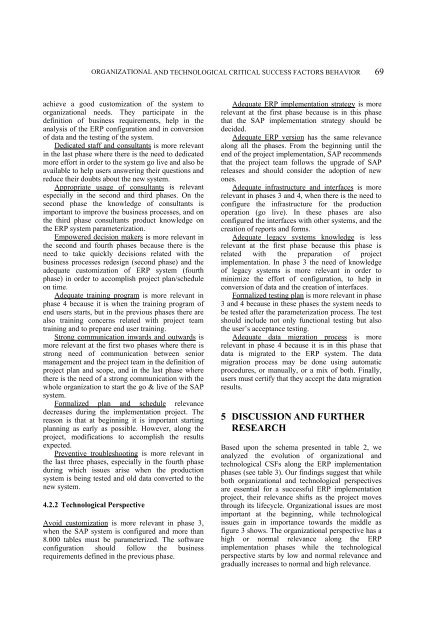Back Room Front Room 2
Back Room Front Room 2
Back Room Front Room 2
You also want an ePaper? Increase the reach of your titles
YUMPU automatically turns print PDFs into web optimized ePapers that Google loves.
ORGANIZATIONAL<br />
AND TECHNOLOGICAL CRITICAL SUCCESS FACTORS BEHAVIOR<br />
achieve a good customization of the system to<br />
organizational needs. They participate in the<br />
definition of business requirements, help in the<br />
analysis of the ERP configuration and in conversion<br />
of data and the testing of the system.<br />
Dedicated staff and consultants is more relevant<br />
in the last phase where there is the need to dedicated<br />
more effort in order to the system go live and also be<br />
available to help users answering their questions and<br />
reduce their doubts about the new system.<br />
Appropriate usage of consultants is relevant<br />
especially in the second and third phases. On the<br />
second phase the knowledge of consultants is<br />
important to improve the business processes, and on<br />
the third phase consultants product knowledge on<br />
the ERP system parameterization.<br />
Empowered decision makers is more relevant in<br />
the second and fourth phases because there is the<br />
need to take quickly decisions related with the<br />
business processes redesign (second phase) and the<br />
adequate customization of ERP system (fourth<br />
phase) in order to accomplish project plan/schedule<br />
on time.<br />
Adequate training program is more relevant in<br />
phase 4 because it is when the training program of<br />
end users starts, but in the previous phases there are<br />
also training concerns related with project team<br />
training and to prepare end user training.<br />
Strong communication inwards and outwards is<br />
more relevant at the first two phases where there is<br />
strong need of communication between senior<br />
management and the project team in the definition of<br />
project plan and scope, and in the last phase where<br />
there is the need of a strong communication with the<br />
whole organization to start the go & live of the SAP<br />
system.<br />
Formalized plan and schedule relevance<br />
decreases during the implementation project. The<br />
reason is that at beginning it is important starting<br />
planning as early as possible. However, along the<br />
project, modifications to accomplish the results<br />
expected.<br />
Preventive troubleshooting is more relevant in<br />
the last three phases, especially in the fourth phase<br />
during which issues arise when the production<br />
system is being tested and old data converted to the<br />
new system.<br />
4.2.2 Technological Perspective<br />
Avoid customization is more relevant in phase 3,<br />
when the SAP system is configured and more than<br />
8.000 tables must be parameterized. The software<br />
configuration should follow the business<br />
requirements defined in the previous phase.<br />
Adequate ERP implementation strategy is more<br />
relevant at the first phase because is in this phase<br />
that the SAP implementation strategy should be<br />
decided.<br />
Adequate ERP version has the same relevance<br />
along all the phases. From the beginning until the<br />
end of the project implementation, SAP recommends<br />
that the project team follows the upgrade of SAP<br />
releases and should consider the adoption of new<br />
ones.<br />
Adequate infrastructure and interfaces is more<br />
relevant in phases 3 and 4, when there is the need to<br />
configure the infrastructure for the production<br />
operation (go live). In these phases are also<br />
configured the interfaces with other systems, and the<br />
creation of reports and forms.<br />
Adequate legacy systems knowledge is less<br />
relevant at the first phase because this phase is<br />
related with the preparation of project<br />
implementation. In phase 3 the need of knowledge<br />
of legacy systems is more relevant in order to<br />
minimize the effort of configuration, to help in<br />
conversion of data and the creation of interfaces.<br />
Formalized testing plan is more relevant in phase<br />
3 and 4 because in these phases the system needs to<br />
be tested after the parameterization process. The test<br />
should include not only functional testing but also<br />
the user’s acceptance testing.<br />
Adequate data migration process is more<br />
relevant in phase 4 because it is in this phase that<br />
data is migrated to the ERP system. The data<br />
migration process may be done using automatic<br />
procedures, or manually, or a mix of both. Finally,<br />
users must certify that they accept the data migration<br />
results.<br />
5 DISCUSSION AND FURTHER<br />
RESEARCH<br />
69<br />
Based upon the schema presented in table 2, we<br />
analyzed the evolution of organizational and<br />
technological CSFs along the ERP implementation<br />
phases (see table 3). Our findings suggest that while<br />
both organizational and technological perspectives<br />
are essential for a successful ERP implementation<br />
project, their relevance shifts as the project moves<br />
through its lifecycle. Organizational issues are most<br />
important at the beginning, while technological<br />
issues gain in importance towards the middle as<br />
figure 3 shows. The organizational perspective has a<br />
high or normal relevance along the ERP<br />
implementation phases while the technological<br />
perspective starts by low and normal relevance and<br />
gradually increases to normal and high relevance.









